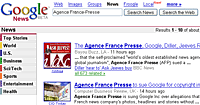 A large question mark hangs over the future of aggregated news sites supplied by Web companies such as Google after it was revealed that Agence France-Presse had sued the world’s most popular search engine for alleged copyright infringement.
A large question mark hangs over the future of aggregated news sites supplied by Web companies such as Google after it was revealed that Agence France-Presse had sued the world’s most popular search engine for alleged copyright infringement.
Google had been making the headline, summaries, and thumbnail photos of news stories available to everyone via a search function. Clicking on the story would then take users to the full story and photos on the original site.
It was this practice that set AFP into a giant hissy fit and before you could say “avocat”, the French news agency were filing a law suit in a Washington court.
The action sought damages and interest of at least US$17.5 million dollars (£9m, €13) and an interdiction on the publication of its text and photos without prior agreement.
“Without AFP’s authorisation, defendant is continuously and wilfully reproducing and publicly displaying AFP’s photographs, headlines and story leads on its Google News Web pages,” AFP huffed and puffed in their lawsuit.
The news agency added that it had already asked Google to stop using its copyrighted work, but that the cheeky monkeys “continued in an unabated manner to violate AFP’s copyrights”.
Since the law suit was announced, Google has embarked on the process of removing all AFP content, but has not released a schedule for when the removal will be complete.
Already some pundits are questioning the wisdom of AFPs litigious action, with the Political Gateway Web site serving up a damning article denouncing the ‘stupidity’ of the press agency:
 “AFP has over 600 online clients using their news services, sites like Political Gateway. Being blacklisted by the number one search engine in the world is enough to make a news site immediately drop AFP and go to another news service like AP, Reuters, UPI, and the like. We know this to be true because Political Gateway is looking at options right now.
“AFP has over 600 online clients using their news services, sites like Political Gateway. Being blacklisted by the number one search engine in the world is enough to make a news site immediately drop AFP and go to another news service like AP, Reuters, UPI, and the like. We know this to be true because Political Gateway is looking at options right now.
AFP will lose all its online clients except Yahoo.com (which is a search engine itself). However, Yahoo also syndicates its news out via RSS or ‘XML’ feeds. RSS allows webmasters to place news headlines on their site. This would be an offense to AFP and result in suing of Yahoo.
When the dust settles we believe AFP, the oldest news organization in the world, will have lost most of their online clients, their reputation, and face the worst Internet backlash a news service has ever encountered.
As of this week, all AFP news information will be deleted from Political Gateway and hundreds of other sites in protest against the stupidity of AFP.”
The Google News service was launched in 2002 with the site – still in beta – gathering stories and images from the Web and making them freely available to everyone.
With Google making the vast majority of its revenue through online advertising, the news service looks to be an important sector in the increasingly competitive online arena.
If other press agencies follow AFPs litigious route, we could see a premature end to this fledgling service.
We hope not.
Agence France-Presse
Google news
“Google shows AFP who is boss” (PoliticalGateway.com)
 A handy Google search feature went live this week that lets users find showtimes at nearby movie theatres using either their computer or mobile phones and other wireless devices that use short-message services.
A handy Google search feature went live this week that lets users find showtimes at nearby movie theatres using either their computer or mobile phones and other wireless devices that use short-message services. After receiving a sound pummelling in previous rounds against the mighty Google, Microsoft has produced a leaner, meaner more bad-ass search engine – and this one looks like it might go the distance.
After receiving a sound pummelling in previous rounds against the mighty Google, Microsoft has produced a leaner, meaner more bad-ass search engine – and this one looks like it might go the distance. Google has added another product to its long list of extended beta services.
Google has added another product to its long list of extended beta services.  Two Google stories in a day! They’re testing a new interface for their search engine that they’re calling Google Suggest.
Two Google stories in a day! They’re testing a new interface for their search engine that they’re calling Google Suggest.